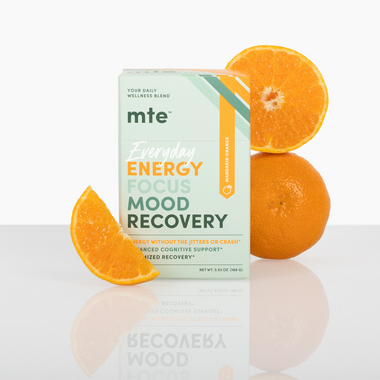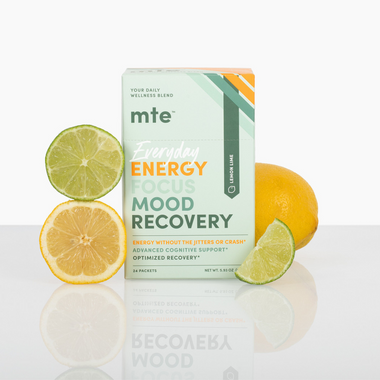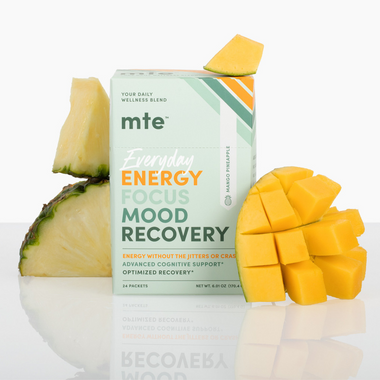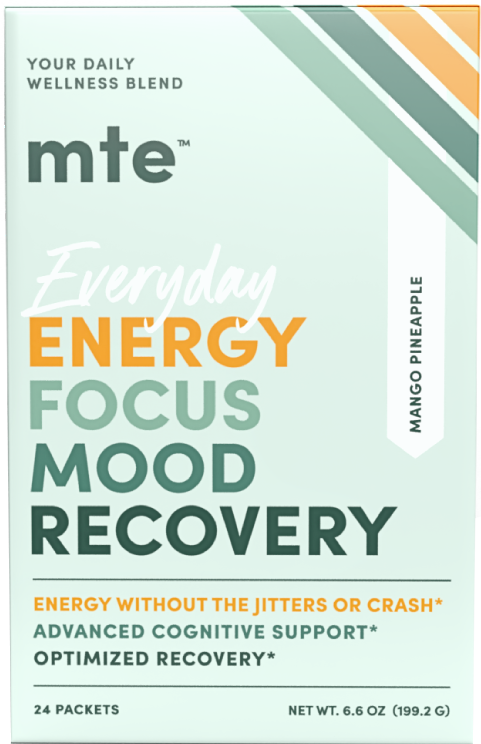
Paraxanthine vs Caffeine: Which is Better for Focus?
Welcome to another episode of MTE Tries It!, where one of our writers compares MTE’s caffeine-free energy powder to a caffeinated energy drink and then waits to see if their heart stops. For this one, I decided to compare MTE with coffee and apply it to study sessions.
As a grad student, my life is literally always on fire, which is fine, because everything is fine. So I’m constantly looking for ways to maximize my time – focus in and be productive. That can be a bit difficult when you feel out of your depth tracking fractional crystallization during magmatic differentiation. It can also be a bit difficult when you’re tediously grading the same assignment for 80 students.
Despite fully understanding caffeine’s not good for me, I drink coffee every day. But the amount of coffee it’s taken me to get this far in the semester is… concerning, to say the least.
So I was like, hey – why don’t I see what MTE does? We just switched to a caffeine-free version powered by paraxanthine – maybe this’ll let me have my stimulant cake and eat it too – without the jitters and crash.
Not familiar with paraxanthine yet? To learn all about paraxanthine – a caffeine metabolite scientifically-backed to boost focus, energy, mood, metabolism, and more, check out our deep dive: Understanding Caffeine’s Metabolites & How Paraxanthine Works.
Methods
For this experiment, I decided I would do 4 trials – 2 caffeine and 2 paraxanthine. I used the most consistent part of my schedule: Monday and Tuesday mornings, when I (attempt to) spend 2 hours grading and 3 hours doing thesis research.
The first week, I drank coffee on Monday and MTE on Tuesday. The second week, I repeated this in the opposite order, and also had to change one problematic variable I encountered the first week. I then rated my study session based on three criteria:
- Mood change from beginning to end of the grading portion
- Motivation left over after the thesis research portion
- How much of the time I actually spent doing what I meant to
I went in with no particular hypothesis; I’m familiar with the scientific literature on both caffeine and paraxanthine, but I didn’t have any specific expectations. I should also disclose that I have an Adderall prescription that’s at play, as I usually take it in the morning.
Week 1: Coffee vs Paraxanthine
In our poorly constructed experiment, a flaw that immediately stands out: the subject is already addicted to coffee. Nevertheless, she persisted.
Week 1, Monday: Coffee
This was essentially just a baseline morning for me.
- I began grading at less-than-enthusiastic and ended at wow-why-don’t-people-try-harder. The amount of feedback I gave was consistent in usual volume, and was slightly terse – also usual.
- After 5 hours of grading and research, the only thing I had motivation to do was be finished with the day. But it was only 1pm, so I just had more coffee and went to the office instead. (It’s not lost on me that my total loss of motivation was, in fact, a caffeine crash.)
- I probably wasted about 1 of the 5 hours? Finding reasons to get up from the computer, letting the kitten distract me, looking into a subject that has nothing to do with the task at hand, etc.
Week 1, Tuesday: MTE Paraxanthine
I learned a hard lesson this day. When I drank MTE and sat down to start grading assignments, I noticed that after 15ish minutes or so, I was already getting into a groove. I felt alert but not ALERT, and less frustrated than usual when grading. Okay!
Then I forgot I hadn’t taken my Adderall that morning. So I took it.
Mistake. Catastrophic failure. Trial I over. While caffeine and my meds play well together, not so with paraxanthine. But that’s science mishaps, right? We’ll try again next week. I’ve also heard from several others this isn’t a problem for them, so it might just be a me thing!
Week 2: Paraxanthine vs Caffeine
Now that I knew I’d have to remove Adderall from the equation when doing this experiment, I thought – maybe this is better anyway? I can see if coffee is actually doing any of the heavy lifting, and I can experience MTE without anything else in the way. So here’s what went down:
Week 2, Monday: MTE Paraxanthine
This is going to sound salesy, but my morning experience with MTE was legit, even if I didn’t get the satisfaction of waking up to the smell of dark roast wafting through the house.
- I started grading out less-than-enthusiastic but ended up almost annoyed I didn’t have time to give more feedback in each student’s assignment. I gave out a lot more “Good job!” and “Nice work!” comments, and I got more done than usual.
- I went hard on the thesis research, to the point where over 2 hours had passed before I thought to look at my phone or refill my water bottle. I went down a bit of a research rabbit hole that wasn’t completely relevant to the subject, but I really enjoy those, so I’m taking it as a positive.
- This was probably one of the most productive mornings I’d had – not just without caffeine, but also without my Adderall. I don’t really feel like I wasted any time. So that’s neat.
Paraxanthine worked the opposite of caffeine: with caffeine, you can feel the changes happening all at once, but with paraxanthine, I just quietly noticed that I was in a clear, alert, focused state of mind after it had already happened. Weird but cool. Not mad. Plus, I got so much stuff done that I actually had time to make dinner that night instead of ordering out!
Week 2, Tuesday: Good Ol’ Coffee
It wasn’t the coffee; it was the Adderall, y’all. This experience would have been laughable if it hadn’t put me behind for the day:
- Started grading out pissed off and ended up more pissed off. Feedback was the normal volume and tone it usually is on my usual coffee+meds cocktail, but I often felt myself staring at an assignment and just zoning out. That added up to significant time lost and less assignments graded.
- I barely dragged myself through the research portion of the session. Like, staring at the screen struggling to keep my eyes open. Reading the same paragraph 3 times and still having no idea what it said. And I really enjoy the subject, so the fact I just wanted to slam my head into the desk and sleep for 2 days says something.
- Y’all, I spent so much time finding reasons to do something – anything – else. I cleaned the house – truly. I probably spend a total of 2.5-3 hours out of the 5 doing any real work. And it was not focused in the least.
Like I said – laughable, except it totally sucked.
Conclusion: What is it That You Want from a Focus Drink?
I have to say, if I were a better person and had an endless supply of MTE, I’d probably kick the caffeine and completely switch to paraxanthine. But then I do so love espresso... The takeaways:
Caffeine
Coffee, in this case – is old hat, in a good and bad way. I know exactly what to expect when I have too little, too much, or develop a headache halfway through the day because I skipped my morning latte. Literally a sign of addiction, but whatever. And now I know that, for me, it’s an absolute joke without the help of another stimulant!
Paraxanthine
MTE, in this case – is unknown territory that still feels familiar. It felt very similar to coffee, but without the part where I get anxious and mad at everything. I was able to zone in and keep on task, but it also wasn’t as noticeable of an effect, which can be taken good or bad. I did love the fact there wasn’t a crash, and it’s nice to think that I might be able to use my Adderall less without sacrificing focus or productivity.
There’s really nothing bad about caffeine when you don’t count the overstimulation, mood disturbances, sleep problems, and risk of dependence. Paraxanthine is the perfect solution, because it sloughed off all that crappy stuff about its parent but retained all the good things. For an overworked grad student trying to simply make it to the end of another semester, no question – MTE is worth a try.






